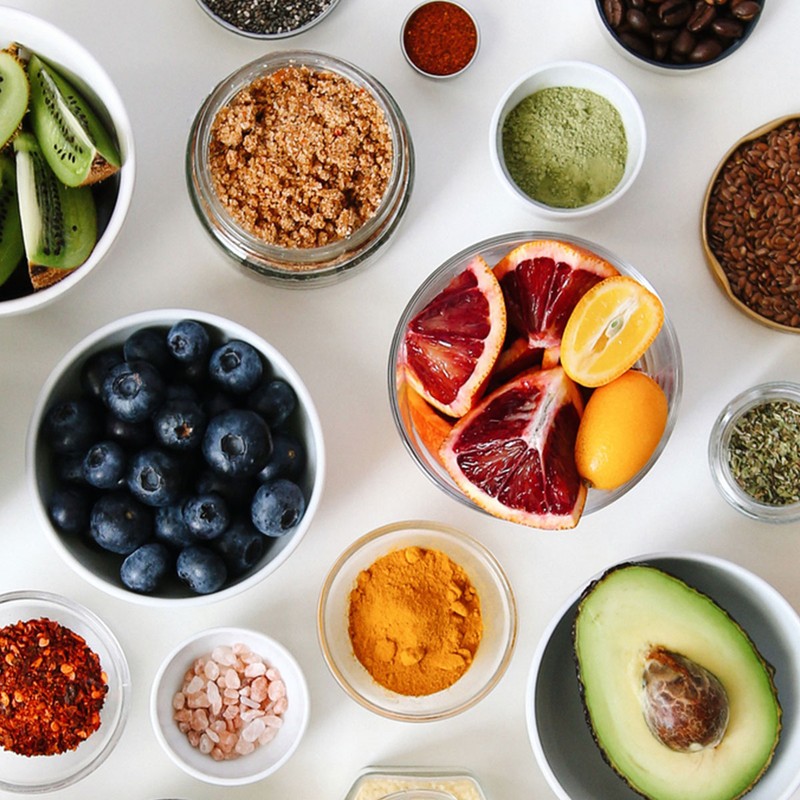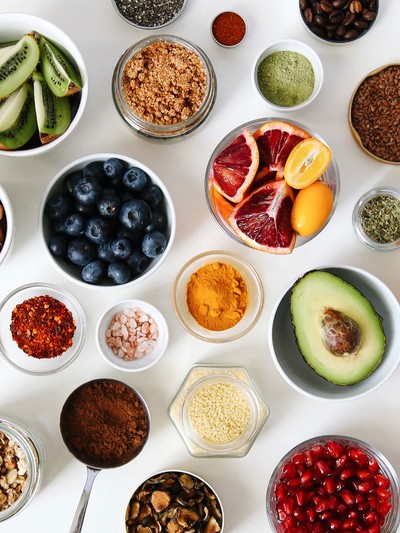

The Health Habits To Switch Up Later In Life
Stop Snacking
“Balancing your blood sugar is the most important dietary change you can make after the age of 50 to maintain optimal energy, mood and vitality. The body is a finely tuned machine and, while glucose is the fuel that keeps it running, we become more sensitive to insulin later in life. If too much glucose floods your bloodstream, it can overwhelm your cells, causing them to become resistant to the effects of insulin. This is known as insulin resistance and it’s a big deal, especially in menopause. The most powerful change you can make is to avoid snacking. This will keep blood sugar balanced and your weight, mood and metabolism in check. Ensure you’re eating enough protein, healthy fats and vegetables at each meal and moderate consumption of wholegrains and fruit, and always be mindful of sugary carbs and sweet drinks.” – Charlotte Hunter, registered nutritional therapist & functional medicine practitioner
Cut Back On Cardio
“Excessive cardio is one of the biggest mistakes you can make later in life. While a certain amount of cardiovascular exercise – along with resistance training and stretching – is crucial to promote healthy bones, lean muscle mass and insulin sensitivity, too much cardio can take its toll on both hormones and our bones. When it comes to exercise, variety is key. This will keep multiple muscle groups challenged and will enable to you to maintain flexibility.” – Charlotte
Approach Probiotics With Caution
“Declining oestrogen levels later in life, combined with a low-fibre diet and too much processed food, can lead to sluggish bowel habits – bloating, gas, constipation, reflux and food sensitivities are common. While it can be tempting to reach for a probiotic or load up on fermented foods, this can be like adding fuel to the fire. When it comes to gut health, knowledge is power. Consider getting a gut barrier and food sensitivity test – I recommend the FIT Test by KBMO Diagnostics. This will give you the information you need to better support gut health with the correct supplements. Alternatively, try keeping a food diary and focus on a natural, wholefood diet with minimal caffeine, alcohol and sugar.” – Charlotte
Use It Or Lose It
“Mental activities that challenge the brain are non-negotiable. The good news is that certain lifestyle habits can promote better cognitive health as we age – think puzzles, learning a new instrument or language, or pursuing a new hobby that demands problem-solving. Social engagement also fuels cognitive health. Meaningful interactions and conversations stimulate neural pathways necessary for cognitive flexibility and memory retention. Physical activity also increases blood flow to the brain, stimulates the growth of new neurons and promotes the release of neurotransmitters.” – Charlotte
Swap Vegetable For Olive Oil
“Keeping inflammation in check is key as you age, and one of the best ways to do this is to ensure you’re eating the right type of fats. Eating processed foods that offer little nutritional value leads to inflammation, which is at the root of most chronic diseases. The average Western diet tends to be high in inflammatory ultra-processed food and is deficient in omega-3 fats. For example, vegetable oils like corn, canola, soybean and safflower oil are highly processed and linked to dementia, heart disease and cancer. Instead, use more olive oil, drizzle extra virgin olive oil on food and eat more oily fish like sardines, salmon, anchovies and trout. Plant-based sources of omega-3 are trickier to find – if you follow a plant-based diet, take an algae oil supplement.” – Nikki Hillis, women’s wellness educator
Don’t Rush Meals
“The production of stomach acid and digestive enzymes slows as we age, which can lead to bloating, indigestion and reflux. Relax and take your time with food, as the body doesn’t prioritise digestion when it’s in a state of stress; and chew well, as saliva contains digestive enzymes that will kickstart the digestion process which means the rest of your digestive system won’t have to work quite so hard. Try having a small amount of lemon juice or apple cider vinegar in a glass of water before meals – this can help digestion.” – Evonne Ginman, lecturer & module coordinator at the Institute for Optimum Nutrition
Optimise Your Circadian Rhythm
“The amount of sleep we need doesn’t change as we age, but some factors may affect the quality and quantity of your sleep, such as a shifting circadian rhythm. Spend time outside every day, ideally first thing in the morning and again at dusk to regulate your body clock. Try to go to bed and wake up at the same time every day, even on weekends, which will help your body adjust to a consistent rhythm.” – Evonne

Prioritise Protein
“Quality protein is a must later in life to maintain muscle mass and bone density. The most nutrient-dense sources are meat, fish, eggs and dairy. Don’t fear eggs or saturated fat – research shows a rise in our cholesterol level as we age is protective, and there is no evidence to show that saturated fats cause heart disease. Prioritise protein at meals over carbs – low-carb, ketogenic diets improve your cardiovascular risk and are associated with reduced inflammation.” – Heather Rosa, dean at the Institute For Optimum Nutrition
…But Spread It Out Over The Day
“As we age, muscle protein synthesis – the process by which the body produces new protein – becomes less efficient. To maintain and promote the production of new muscle, it’s not just about the total amount of protein consumed throughout the day, but also evenly distributing intake across meals. Aim for 25-30g of high-quality protein per meal to ensure a steady supply of strength-building amino acids, and vary your protein sources where possible to ensure a wide spectrum of nutrients – Greek yoghurt, chicken, cottage cheese, turkey, fish and tofu are good ways to mix things up.” – Helen Perks, registered nutritional therapist
Protect Your Bones
“Looking after your bones is critical, and while calcium is important, there are other nutrients that play an equally important role in optimising bone health. For example, vitamin D3 aids calcium absorption. Vitamin D3 can be tricky to find in food, so consider a supplement. Magnesium is also involved in bone formation – good sources include nuts, legumes and wholegrains – while vitamin K2 ensures calcium is effectively used. Sources of vitamin K2 include hard cheese like Edam, egg yolks, chicken, liver, sauerkraut and kimchi. Omega-3 fatty acids are also associated with higher bone density – eat more fatty fish, flaxseeds and walnuts.” – Helen
Strengthen Family Ties
“Social connections are hugely important for our wellbeing. Chronic loneliness affects more than a million older people in the UK, and evidence suggests there’s a link between loneliness and an increased risk of dementia. Keep your ties to friends and family and work on strengthening social connections. Recent studies also show being around younger people can have huge benefits on our wellbeing, so spend time with grandchildren. If you don’t have younger ones in your life, or if they aren’t nearby, get involved with an intergenerational project in your area or volunteer at a local baby and children’s group.” – Heather
Eat A Mediterranean Diet
“A diet rich in colourful, organic fruit and vegetables, as well as complex carbs, healthy fats and lean protein, is proven to be one of the healthiest diets on the planet. Include antioxidant-rich foods daily to reduce the signs of ageing and limit cellular damage – broccoli, avocado, sweet potato, blueberries and pomegranate are particularly nutrient dense. Broccoli also contains a compound that boosts DNA repair cells.” – Nikki
Stay Active
“Weight gain during the menopause is often associated with becoming more sedentary. All activity counts – gardening, housework and walking up the stairs, as well as mobility and yoga. Changing hormone levels can disrupt sleep, so on the days you have less motivation to exercise, think LISS – low intensity steady state exercise – and walk as much as you can. The most important advice is to avoid a sedentary lifestyle, listen to your body and commit to a balance of strength and mobility training. Be sure to include some calming practices to support mental wellness, too.” – Claire Finlay, fitness specialist at WomenWise & founder of Transition Zone
Try Something New
“To treat or prevent osteoporosis, weight training will build bone mass and slow degeneration. For those with arthritis, try swimming or biking. Yoga, Qigong, Pilates and tai chi are also worth exploring – they’re excellent ways of building strength and developing balance to prevent falls. Studies show Qigong is a superior exercise to slow ageing – it can help treat high blood pressure, improve heart health and increase hormone levels. It also has a therapeutic effect on balancing the meridians and organs.” – Nikki
Get Your Hormones Tested
“If you are on HRT or post-menopausal, find a nutritional therapist who offers the DUTCH Test. DUTCH testing is unique as it helps identify symptoms of hormonal imbalances by providing a complete picture of your hormone levels which can’t be seen in blood tests. The test measures cortisol levels and your oestrogen patterns, as well as how effectively the body can detoxify oestrogen. Proper oestrogen detoxification is crucial as an imbalance can raise your risk of hormone-related cancers, and knowledge can help you make a more informed decision regarding HRT. If you’re working with a nutritional therapist, also consider micronutrient testing for a deep dive into how your body is utilising vitamins, minerals, amino acids and antioxidants. This is a great way to pinpoint deficiencies or imbalances at a cellular level.” – Helen
For more from the experts visit CharlotteHunterNutrition.co.uk, NikkiHillis.com, ION.ac.uk, HelenPerks.com, TransitionZone.co.uk and WomenWise.Health
DISCLAIMER: Features published by SheerLuxe are not intended to treat, diagnose, cure or prevent any disease. Always seek the advice of your GP or another qualified healthcare provider for any questions you have regarding a medical condition, and before undertaking any diet, exercise or other health-related programme.
DISCLAIMER: We endeavour to always credit the correct original source of every image we use. If you think a credit may be incorrect, please contact us at info@sheerluxe.com.

